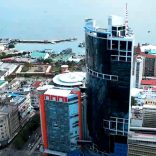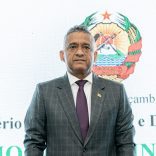Investment accounts for less than 20% of Mozambique's 2025 budget expenditure
Mozambican public debt is now 12.37 billion dollars – AIM report

Photo: TVM
According to the Minister of Economy and Finance, Adriano Maleiane, Mozambique’s public debt currently stands at 12.37 billion US dollars, of which about 16 per cent is owed to China.
Speaking in the country’s parliament, the Assembly of the Republic, and answering a question from the main opposition party, Renamo, about how much money is owed to China, Maleiane put the amount at 2.02 billion dollars.
The great majority of this, 1.97 billion dollars, is owed to the Chinese Exim Bank, and was mostly used to pay for roads and bridges, including the Maputo Ring Road, the suspension bridge across the Bay of Maputo, and the roads from the southern end of the bridge to the border with the South African province of Kwazulu-Natal.
Maleiane did not envisage difficulties in repayment. He pointed out that motorists must pay tolls to use the bridge and the roads and so, in the long run, they will pay for themselves.
Read more: Maputo-Catembe: Two years of a bridge (still) below expectations
Of the total 12.37 billion dollars of public debt, 9.85 billion is foreign debt, and the rest domestic debt, raised through high interest bearing treasury bonds. 4.35 billion dollars of the foreign debt is owed to multilateral institutions such as the World Bank and the African Development Bank (ADB).
Maleiane said the debts owed by the fraudulent, security related companies Proindicus and MAM (Mozambique Asset Management) have been excluded from the public debt. These were two of the companies that contracted loans from the banks Credit Suisse and VTB of Russia in 2013 and 2014, on the basis of illicit loan guarantees issued by the government of the day, under the then President Armando Guebuza.
The guarantees, for what have become known as “the hidden debts”, were mostly signed by the then Finance Minister Manuel Chang, who is wanted in both Mozambique and the United States for his part in the fraud.
Both these loans are now before courts in London. Mozambique is suing Credit Suisse over the Proindicus loan, and VTB is suing the Mozambican state over the MAM loan (despite a VTB promise in 2019 that it would never issue an ultimatum to a “friendly country” such as Mozambique).
Maleiane claimed that Mozambique’s current relations with the International Monetary Fund are “excellent”. He admitted that, in 2016, when the true scale of the hidden debts became clear, “the IMF could have punished us for misreporting” – in other words, for concealing the truth about Mozambique’s debts.
But the only action the IMF took was to suspend its programme with Mozambique. “The country has been doing all it can to deserve the confidence of its partners”, said Maleiane. Loans were continuing to flow in, he added, particularly from the World Bank.












Leave a Reply
Be the First to Comment!
You must be logged in to post a comment.
You must be logged in to post a comment.